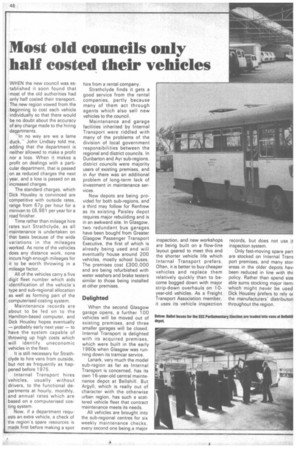Most old councils only half costed their vehicles
Page 48

If you've noticed an error in this article please click here to report it so we can fix it.
WHEN the new council was established it soon found that most of the old authorities had only half costed their transport. The new region vowed from the beginning to cost each vehicle individually so that there would be no doubt about the accuracy of any charge made to the hiring departments.
In no way are we a lame duck,'" John Lindsay told me, adding that the department is neither allowed to make a profit nor a loss. When it makes a profit on dealings with a particular department, that is passed on as reduced charges the next year, and a loss is passed on as increased charges.
The standard charges, which Dick Housley is convinced are competitive with outside rates, range from 67p per hour for a minivan to £6,981 per year for a road finisher.
Time rather than mileage hire rates suit Strathclyde, as all maintenance is undertaken on that basis because of the wide variations in the mileages worked. As none of the vehicles does any distance work, none incurs high enough mileages for it to be worth throwing in a mileage factor.
All of the vehicles carry a five digit fleet number which aids identification of the vehicle's type and sub-regional allocation as well as forming part of the computerised costing system.
Maintenance records are about to be fed on to the Hamilton-based computer, and Dick Housley hopes eventually — probably early next year — to have the system capable of throwing up high costs which will identify uneconomic vehicles in the fleet.
It is still necessary for Strathclyde to hire vans from outside, but not as frequently as happened before 1975.
Internal Transport hires vehicles, usually without drivers, to the functional departments at hourly, monthly, and annual rates which are based on a computerised costing system.
Now, if a department requests an extra vehicle, a check of the region's spare resources is made first before making a spot hire from a rental company.
Strathclyde finds it gets a good service from the rental companies, partly because many of them act through agents which also sell new vehicles to the council.
Maintenance and garage facilities inherited by Internal Transport were riddled with many of the problems of the division of local government responsibilities between the regional and district councils. In Dunbarton and Ayr sub-regions, district councils were majority users of existing premises, and in Ayr there was an additional problem of long-term lack of investment in maintenance services.
New depots are being pro-, vided for both sub-regions, and a third may follow for Renfrew as its existing Paisley depot requires major rebuilding and is in an awkward site. In Glasgow, two redundant bus garages have been boughf from Greater Glasgow Passenger Transport Executive, the first of which is already being used and will eventually house around 200 vehicles, mostly school buses. The premises cost £300,000 and are being refurbished with water washers and brake testers similar to those being installed at other premises.
Delighted When the second Glasgow garage opens, a further 100 vehicles will be moved out of existing premises, and three smaller garages will be closed. Internal Transport is delighted with its acquired premises, which were built in the early 1 9 6 Os when Glasgow was running down its tramcar service.
Lanark, very much the model sub-region as far as Internal Transport is concerned, has its own 16-year-old central maintenance depot at Bellshill. But Argyll, which is really out of character with the otherwise urban region, has such a scattered vehicle fleet that contract maintenance meets its needs.
All vehicles are brought into the sub-regional centres for six weekly maintenance checks, every second one being a major inspection, and new workshops are being built on a flow-line layout geared to meet this and the shorter vehicle life which Internal Transport prefers. Often, it is better to buy cheaper vehicles and replace them relatively quickly than to become bogged down with major strip-down overhauls on 10year-old vehicles. As a Freight Transport Association member, it uses its vehicle inspection records, but does not use it inspection system.
Only fast-moving spare part are stocked on Internal Trans port premises, and many stor areas in the older depots hay+ been reduced in line with thi policy. Rather than spend size able sums stocking major item: which might never be used Dick Housley prefers to rely or the manufacturers' distributon throughout the region.
































































































































